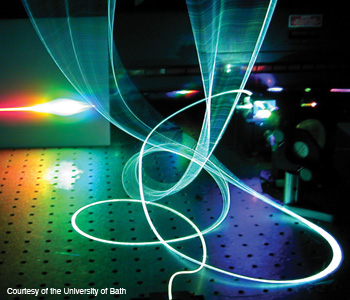Feature
How the Laser Launched Nonlinear Optics
If the laser was a solution, nonlinear optics was one of the problems it was seeking. Intense pulses of coherent, monochromatic light were just what was needed to produce nonlinear effects. Once physicists got their first lasers, nonlinear optics blossomed in a golden age of discovery.
 Nonlinear optics produces a broadband supercontinuum of light. Self-phase modulation of light passing through a highly nonlinear optical fiber spreads the input light across the whole visible spectrum.
Nonlinear optics produces a broadband supercontinuum of light. Self-phase modulation of light passing through a highly nonlinear optical fiber spreads the input light across the whole visible spectrum.
Nonlinear optics was discovered long before the laser, but lasers made the field bloom. The short, bright, coherent pulses from the ruby laser concentrated light in just the way needed to produce previously unobservable nonlinear effects. Peter Franken launched a burst of research activity with his landmark 1961 experiment in which he fired pulses from a rented ruby laser into a quartz crystal at the University of Michigan.
…Log in or become a member to view the full text of this article.
This article may be available for purchase via the search at Optica Publishing Group.
Optica Members get the full text of Optics & Photonics News, plus a variety of other member benefits.
